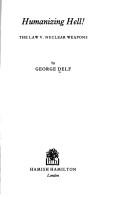| Listing 1 - 10 of 103 | << page >> |
Sort by
|
Book
ISBN: 3261037903 Year: 1987 Publisher: Bern : Peter Lang,
Abstract | Keywords | Export | Availability | Bookmark
 Loading...
Loading...Choose an application
- Reference Manager
- EndNote
- RefWorks (Direct export to RefWorks)

ISBN: 0241115930 Year: 1985 Publisher: London Hamilton
Abstract | Keywords | Export | Availability | Bookmark
 Loading...
Loading...Choose an application
- Reference Manager
- EndNote
- RefWorks (Direct export to RefWorks)
Book
Year: 1965 Publisher: Chicago London University of Chicago Press
Abstract | Keywords | Export | Availability | Bookmark
 Loading...
Loading...Choose an application
- Reference Manager
- EndNote
- RefWorks (Direct export to RefWorks)

ISBN: 3789298999 9783789298998 Year: 1983 Publisher: München: Olzog,
Abstract | Keywords | Export | Availability | Bookmark
 Loading...
Loading...Choose an application
- Reference Manager
- EndNote
- RefWorks (Direct export to RefWorks)
Book
ISBN: 9781138225428 1138225428 Year: 2018 Publisher: Abingdon: Routledge,
Abstract | Keywords | Export | Availability | Bookmark
 Loading...
Loading...Choose an application
- Reference Manager
- EndNote
- RefWorks (Direct export to RefWorks)
Despite clear legal rules and political commitments, no significant progress has been made in nuclear disarmament for two decades. Moreover, not even the use of these weapons has been banned to date. New ideas and strategies are therefore necessary. The author explores an alternative approach to arms control focusing on the human dimension rather than on States’ security: "humanization" of arms control!The book explores the preparatory work on arms control treaties and in particular the role of civil society. It analyzes the positive experiences of the movements against chemical weapons, anti-personnel mines, and cluster munitions, as well as the recent conclusion of the Arms Trade Treaty. The author examines the question of whether civil society will be able to replicate the success strategies that have been used, in particular, in the field of anti-personnel mines (Ottawa Convention) and cluster munitions (Oslo Convention) in the nuclear weapons field. Is there any reason why the most destructive weapons should not be outlawed by a legally binding instrument?The book also explains the effects of weapons, especially nuclear weapons, on human beings, the environment, and global development, thereby focusing on vulnerable groups, such as indigenous peoples, women, and children. It takes a broad approach to human rights, including economic, social, and cultural rights. The author concludes that the use of nuclear weapons is illegal under international humanitarian and human rights law and, moreover, constitutes international crimes under the Rome Statute of the International Criminal Court.In his general conclusions, the author makes concrete proposals for the progress toward a world without nuclear weapons.
Book
ISBN: 9780941320535 0941320537 Year: 1990 Publisher: Dobbs Ferry (N.Y.): Transnational publishers,
Abstract | Keywords | Export | Availability | Bookmark
 Loading...
Loading...Choose an application
- Reference Manager
- EndNote
- RefWorks (Direct export to RefWorks)
Nuclear weapons (International law) --- Nuclear disarmament.
Book
Year: 1979 Publisher: 's-Gravenhage : Nederlands Instituut voor Vredesvraagstukken,
Abstract | Keywords | Export | Availability | Bookmark
 Loading...
Loading...Choose an application
- Reference Manager
- EndNote
- RefWorks (Direct export to RefWorks)
Nuclear weapons (International law). --- Netherlands --- Military policy.
Book
Year: 2017 Publisher: [Place of publication not identified] : Great Neck Publishing,
Abstract | Keywords | Export | Availability | Bookmark
 Loading...
Loading...Choose an application
- Reference Manager
- EndNote
- RefWorks (Direct export to RefWorks)
Nuclear arms control. --- Nuclear weapons (International law)
Book
Year: 1982 Publisher: Santa Monica, CA : RAND Corporation,
Abstract | Keywords | Export | Availability | Bookmark
 Loading...
Loading...Choose an application
- Reference Manager
- EndNote
- RefWorks (Direct export to RefWorks)
Develops the implications of the international law of armed conflict for various applications of the concept of assured destruction to U.S. strategic nuclear arms planning. Chapter II describes the nature of the law of armed conflict in terms of its origins and scope. Chapter III then outlines the requirements of that law that are pertinent to strategic strike planning. Chapter IV takes up four general questions about the relevance of the law to the current concepts of modern nuclear warfare. Against this background of the law, Chap. V provides an analysis of the implications for four classes of strategic planning and planners. Chapter VI concludes with some philosophical speculations on the origins of the observed inconsistencies between the law of armed conflict and U.S. strategic nuclear planning and on means for resolving these inconsistencies.
Book
Abstract | Keywords | Export | Availability | Bookmark
 Loading...
Loading...Choose an application
- Reference Manager
- EndNote
- RefWorks (Direct export to RefWorks)
describes campaign from peace movements to initiate a procedure before the International Court of Justice on the illegality of nuclear weapons.
Nuclear disarmament --- Nuclear weapons (International law) --- Peace
| Listing 1 - 10 of 103 | << page >> |
Sort by
|

 Search
Search Feedback
Feedback About UniCat
About UniCat  Help
Help News
News